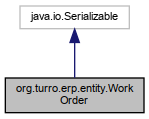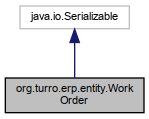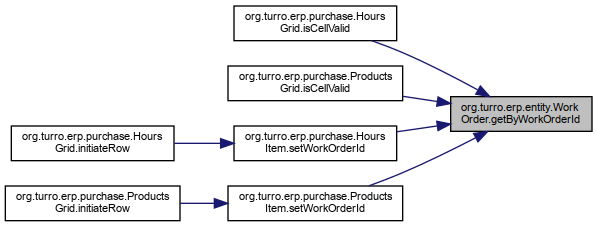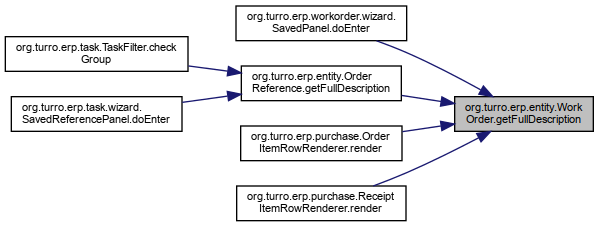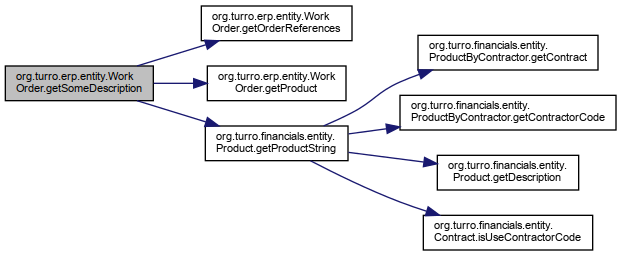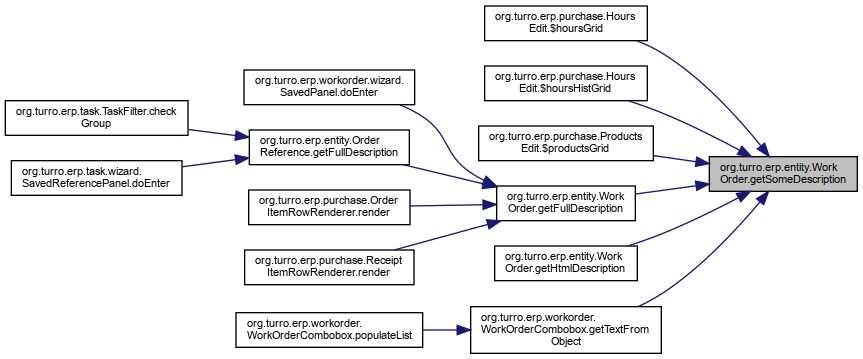- Author
- Lluis Turró Cutiller lluis.nosp@m.@tur.nosp@m.ro.or.nosp@m.g
Definition at line 44 of file WorkOrder.java.
◆ clearEmptyLines()
| void org.turro.erp.entity.WorkOrder.clearEmptyLines |
( |
| ) |
|
Definition at line 297 of file WorkOrder.java.
298 Iterator<OrderReference> it = orderReferences.iterator();
299 while(it.hasNext()) {
300 OrderReference or = it.next();
302 or.setWorkOrder(
null);
◆ getByWorkOrderId()
| static WorkOrder org.turro.erp.entity.WorkOrder.getByWorkOrderId |
( |
long |
value | ) |
|
|
static |
Definition at line 365 of file WorkOrder.java.
367 Dao dao =
new ErpPU();
368 return (WorkOrder) dao.getSingleResultOrNull(
369 "select wo from WorkOrder as wo " +
370 "where wo.workOrderId = ?",
371 new Object[] { value });
◆ getContract()
| Contract org.turro.erp.entity.WorkOrder.getContract |
( |
| ) |
|
Definition at line 214 of file WorkOrder.java.
215 return contract.getEntity(contractId);
◆ getContractId()
| long org.turro.erp.entity.WorkOrder.getContractId |
( |
| ) |
|
◆ getCost()
| double org.turro.erp.entity.WorkOrder.getCost |
( |
| ) |
|
Definition at line 357 of file WorkOrder.java.
359 for(OrderReference or : orderReferences) {
360 cost += or.getCost();
◆ getDescription()
| String org.turro.erp.entity.WorkOrder.getDescription |
( |
| ) |
|
◆ getExtensions()
| Set<WorkOrder> org.turro.erp.entity.WorkOrder.getExtensions |
( |
| ) |
|
◆ getFullDescription()
| String org.turro.erp.entity.WorkOrder.getFullDescription |
( |
| ) |
|
Definition at line 322 of file WorkOrder.java.
323 return (
isDraft() ?
"" : workOrderId +
" - ") +
String getSomeDescription()
◆ getHtmlDescription()
| String org.turro.erp.entity.WorkOrder.getHtmlDescription |
( |
| ) |
|
◆ getId()
| long org.turro.erp.entity.WorkOrder.getId |
( |
| ) |
|
◆ getNextBudgetNumber()
| long org.turro.erp.entity.WorkOrder.getNextBudgetNumber |
( |
| ) |
|
Definition at line 337 of file WorkOrder.java.
341 for(Budget b : or.getBudgets()) {
342 num = Math.max(num, b.getBudgetNumber() + 1);
Set< OrderReference > getOrderReferences()
◆ getOrderReferences()
| Set<OrderReference> org.turro.erp.entity.WorkOrder.getOrderReferences |
( |
| ) |
|
◆ getParent()
| WorkOrder org.turro.erp.entity.WorkOrder.getParent |
( |
| ) |
|
◆ getPetitioner()
| Contact org.turro.erp.entity.WorkOrder.getPetitioner |
( |
| ) |
|
Definition at line 230 of file WorkOrder.java.
231 return petitioner.getEntity(petitionerId);
◆ getPetitionerId()
| String org.turro.erp.entity.WorkOrder.getPetitionerId |
( |
| ) |
|
◆ getPrice()
| double org.turro.erp.entity.WorkOrder.getPrice |
( |
| ) |
|
Definition at line 349 of file WorkOrder.java.
351 for(OrderReference or : orderReferences) {
352 price += or.getPrice();
◆ getProduct()
| Product org.turro.erp.entity.WorkOrder.getProduct |
( |
| ) |
|
Definition at line 198 of file WorkOrder.java.
199 return product.getEntity(productId);
◆ getProductId()
| long org.turro.erp.entity.WorkOrder.getProductId |
( |
| ) |
|
◆ getSavedOrderReferences()
| Set<OrderReference> org.turro.erp.entity.WorkOrder.getSavedOrderReferences |
( |
| ) |
|
Definition at line 327 of file WorkOrder.java.
328 HashSet<OrderReference>
set =
new HashSet<OrderReference>();
329 for(OrderReference or : orderReferences) {
◆ getSomeDescription()
| String org.turro.erp.entity.WorkOrder.getSomeDescription |
( |
| ) |
|
Definition at line 256 of file WorkOrder.java.
259 return p !=
null ? p.getProductString() :
"";
261 if(!Strings.isBlank(description)) {
264 MultipleString ms =
new MultipleString();
266 ms.add(or.getSomeDescription());
268 return ms.getString(100);
◆ getSupervised()
◆ getView()
◆ getViewId()
| long org.turro.erp.entity.WorkOrder.getViewId |
( |
| ) |
|
◆ getWorkOrderDate()
| Date org.turro.erp.entity.WorkOrder.getWorkOrderDate |
( |
| ) |
|
◆ getWorkOrderId()
| long org.turro.erp.entity.WorkOrder.getWorkOrderId |
( |
| ) |
|
◆ isDraft()
| boolean org.turro.erp.entity.WorkOrder.isDraft |
( |
| ) |
|
◆ isEmpty()
| boolean org.turro.erp.entity.WorkOrder.isEmpty |
( |
| ) |
|
Definition at line 283 of file WorkOrder.java.
284 boolean empty = workOrderDate ==
null;
287 for(OrderReference or : orderReferences) {
◆ isProductOrder()
| boolean org.turro.erp.entity.WorkOrder.isProductOrder |
( |
| ) |
|
◆ prepareForSaving()
| void org.turro.erp.entity.WorkOrder.prepareForSaving |
( |
| ) |
|
Definition at line 308 of file WorkOrder.java.
310 for(WorkOrder wo : extensions) {
311 wo.prepareForSaving();
313 for(OrderReference or : orderReferences) {
314 or.prepareForSaving();
316 if(workOrderId == 0 && !draft) {
317 workOrderId = IdUtils.getMaxLongIdFromLong(
318 new ErpPU(),
"WorkOrder",
"workOrderId");
◆ setContract()
| void org.turro.erp.entity.WorkOrder.setContract |
( |
Contract |
contract | ) |
|
Definition at line 218 of file WorkOrder.java.
219 contractId = this.contract.setEntity(contract);
◆ setContractId()
| void org.turro.erp.entity.WorkOrder.setContractId |
( |
long |
contractId | ) |
|
◆ setDescription()
| void org.turro.erp.entity.WorkOrder.setDescription |
( |
String |
description | ) |
|
Definition at line 96 of file WorkOrder.java.
97 this.description = description;
◆ setDraft()
| void org.turro.erp.entity.WorkOrder.setDraft |
( |
boolean |
draft | ) |
|
◆ setExtensions()
| void org.turro.erp.entity.WorkOrder.setExtensions |
( |
Set< WorkOrder > |
extensions | ) |
|
◆ setId()
| void org.turro.erp.entity.WorkOrder.setId |
( |
long |
id | ) |
|
◆ setOrderReferences()
| void org.turro.erp.entity.WorkOrder.setOrderReferences |
( |
Set< OrderReference > |
orderReferences | ) |
|
Definition at line 128 of file WorkOrder.java.
129 this.orderReferences = orderReferences;
◆ setParent()
| void org.turro.erp.entity.WorkOrder.setParent |
( |
WorkOrder |
parent | ) |
|
◆ setPetitioner()
| void org.turro.erp.entity.WorkOrder.setPetitioner |
( |
Contact |
petitioner | ) |
|
Definition at line 234 of file WorkOrder.java.
235 petitionerId = this.petitioner.setEntity(petitioner);
◆ setPetitionerId()
| void org.turro.erp.entity.WorkOrder.setPetitionerId |
( |
String |
petitionerId | ) |
|
◆ setProduct()
| void org.turro.erp.entity.WorkOrder.setProduct |
( |
Product |
product | ) |
|
Definition at line 202 of file WorkOrder.java.
203 productId = this.product.setEntity(product);
◆ setProductId()
| void org.turro.erp.entity.WorkOrder.setProductId |
( |
long |
productId | ) |
|
◆ setSupervised()
| void org.turro.erp.entity.WorkOrder.setSupervised |
( |
OwnedAptitude |
supervised | ) |
|
◆ setView()
| void org.turro.erp.entity.WorkOrder.setView |
( |
RegisterView |
view | ) |
|
Definition at line 250 of file WorkOrder.java.
251 viewId = this.view.setEntity(view);
◆ setViewId()
| void org.turro.erp.entity.WorkOrder.setViewId |
( |
long |
viewId | ) |
|
◆ setWorkOrderDate()
| void org.turro.erp.entity.WorkOrder.setWorkOrderDate |
( |
Date |
workOrderDate | ) |
|
Definition at line 176 of file WorkOrder.java.
177 this.workOrderDate = workOrderDate;
◆ setWorkOrderId()
| void org.turro.erp.entity.WorkOrder.setWorkOrderId |
( |
long |
workOrderId | ) |
|
The documentation for this class was generated from the following file:
